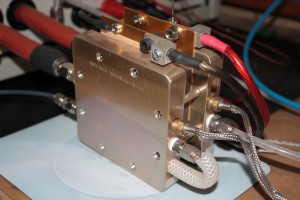 It is a type of device that uses chemical energy to generate electrical energy and appears as an alternative form of energy generation and storage. These devices are called “fuel cells,” and the main difference between them and batteries is that chemicals undergoing chemical reactions are not initially inside them but are continually introduced from outside. Although the name suggests the existence of a combustion, what actually occurs is a chemical reaction that leads to complete oxidation of a substance, which is known as a combustion reaction. The oxidation reaction of this fuel occurs at an electrode called the anode, while a reduction reaction of another substance, usually oxygen, occurs at the cathode. In this way the fuel cells do not discharge like batteries but operate continuously as long as the chemicals undergoing chemical reactions inside them are supplied. Thus, you can have an external reservoir that can be replenished quickly (like in a car), not requiring long recharging times, as in the case of batteries. The great advantages of fuel cells, besides being able to operate for long periods of time, are that they are clean, quiet, efficient and can operate from renewable substances.
It is a type of device that uses chemical energy to generate electrical energy and appears as an alternative form of energy generation and storage. These devices are called “fuel cells,” and the main difference between them and batteries is that chemicals undergoing chemical reactions are not initially inside them but are continually introduced from outside. Although the name suggests the existence of a combustion, what actually occurs is a chemical reaction that leads to complete oxidation of a substance, which is known as a combustion reaction. The oxidation reaction of this fuel occurs at an electrode called the anode, while a reduction reaction of another substance, usually oxygen, occurs at the cathode. In this way the fuel cells do not discharge like batteries but operate continuously as long as the chemicals undergoing chemical reactions inside them are supplied. Thus, you can have an external reservoir that can be replenished quickly (like in a car), not requiring long recharging times, as in the case of batteries. The great advantages of fuel cells, besides being able to operate for long periods of time, are that they are clean, quiet, efficient and can operate from renewable substances.





